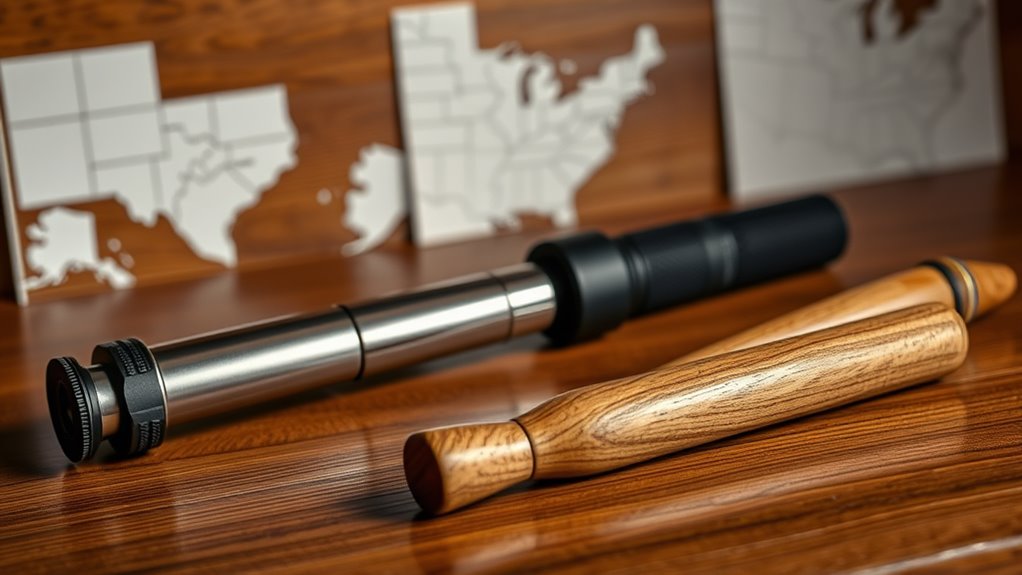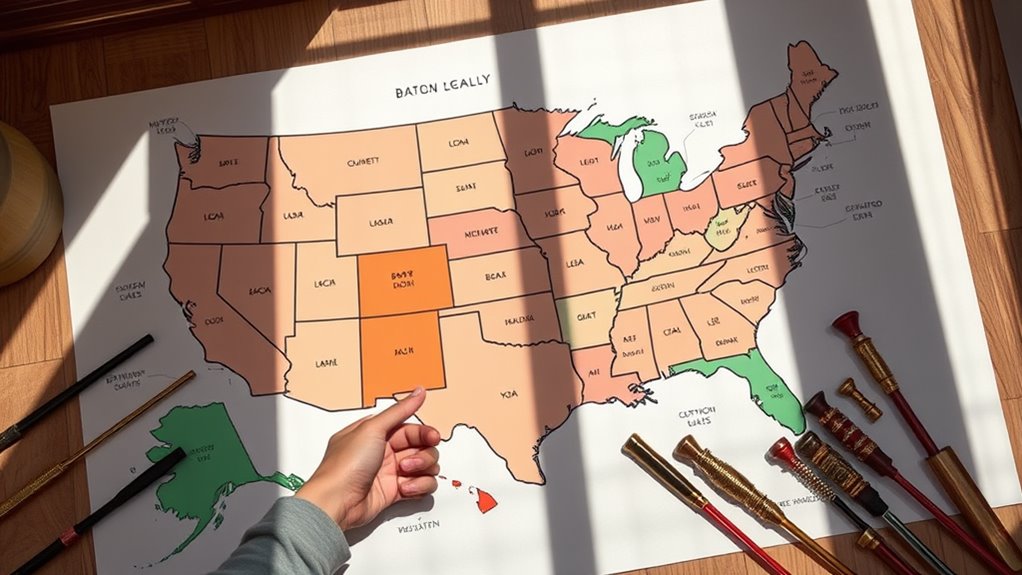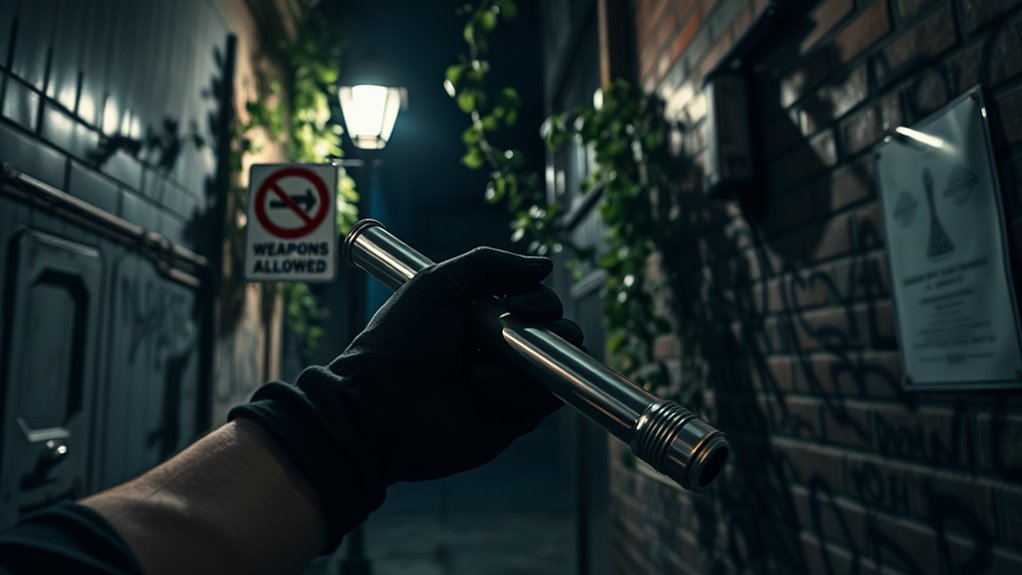Are batons legal for civilian use in your state? Well, that depends! The rules vary a lot across the U.S. In some states, like Texas, you can carry one, but only if you use it non-aggressively. Others, like California, limit baton length and specify they must be for self-defense. Some places even require training. It's super important to know your local laws because using a baton incorrectly could land you in trouble. So, if you're curious about the details for your state, keep that curiosity burning, and we'll help you uncover what you need to know!
Overview of Baton Types

When exploring baton types, you'll find a variety designed for different purposes and users. Each type has unique impact factors that make them suitable for specific situations. For instance, telescoping batons are compact and easy to carry, while expandable batons provide more reach when needed. The materials used in batons also play a significant role; aluminum is lightweight, while steel offers durability. Some batons even come with rubber grips for better handling. The 110,000,000 volt Bad Ass Metal Stun Baton and Flashlight, made from aircraft quality aluminum, is another option for those considering a multi-functional tool. Whether you're considering a baton for self-defense or training, knowing these differences can help you choose the right one. In California, steel batons are now legally permissible for self-defense, providing effective options for public use.
General Legal Principles
Understanding the legal principles surrounding baton use is essential for anyone considering their purchase or use.
You need to know that self defense laws vary by state, which means what's legal in one place mightn't be in another.
Generally, batons can be used for personal safety, but only under specific circumstances. If you're using a baton for self-defense, you must prove that it was necessary to protect yourself from harm. The 12 Inch Telescopic Steel Baton is one such product designed for personal safety, and it is important to ensure its use aligns with state laws.
Remember, using a baton improperly can lead to serious legal trouble. So, always be cautious and informed!
Before purchasing a baton, consider if current sale promotions might affect your decision.
Check your local laws before making any decisions. It's better to be safe than sorry—both for your security and your legal standing!
Stay smart, stay safe, and know your rights!
State-by-State Analysis

Laws regarding baton use can vary considerably from state to state, so it's vital to break them down for clarity.
Some states allow batons for self-defense, while others have strict regulations or outright bans. In places with lenient self-defense laws, you might find that baton training is encouraged, helping you use them safely and effectively.
However, in states with tighter restrictions, you could face legal trouble if you're caught with one. Knowing your state's specific laws is important, especially if you're considering baton training.
It's not just about having one; it's about understanding when and how you can legally use it. So, stay informed and make sure you're on the right side of the law!
States That Allow Batons
Some states embrace the use of batons for civilian self-defense, allowing residents to carry and use them under specific conditions.
These states recognize the baton's long history as a self-defense tool, originally used by law enforcement. In places like Texas and Florida, you can legally carry a baton, provided you follow certain rules.
You'll find that these states understand the importance of self-defense applications, giving you a sense of security.
Just remember, while you can carry a baton, it's meant for protection, not for starting trouble.
So, stay informed about your local laws, and always use your baton responsibly.
After all, knowing when and how to use it can make all the difference in a tough situation!
States With Restrictions

In many states, restrictions on baton possession and use can complicate your self-defense options. Understanding these regulations is key, especially if you've undergone self-defense training. Some states enforce specific police regulations regarding the size, type, or purpose of batons, which can limit your choices. Here's a quick look at states with notable restrictions:
| State | Baton Size Limit | Special Conditions |
|---|---|---|
| California | 21 inches | Must be for self-defense |
| New York | No specific limit | Must have training |
| Texas | 24 inches | Not for aggressive use |
| Florida | 26 inches | Must be a non-lethal type |
| Illinois | 18 inches | Requires a permit |
Stay informed to guarantee you're on the right side of the law!
Prohibited States
While many states have specific regulations regarding baton possession, others take a firmer stance, outright prohibiting them for civilian use.
If you live in one of these states, you'll want to pay attention! These laws aim to keep everyone safe, as batons can be seen as dangerous in civilian self defense situations.
States like New York and California have strict baton regulations, making it illegal for regular folks to carry them.
You might think, "But I just want to protect myself!" Unfortunately, the law doesn't always see it that way.
Always check your local regulations before considering a baton for self defense. It's better to be aware of the rules than to face legal trouble!
Exceptions and Special Cases

Occasionally, there are exceptions to the general rules surrounding baton legality for civilian use. For instance, some states allow batons in self defense scenarios, where you may need to protect yourself from an immediate threat.
However, it's vital to know that these laws can vary widely, so double-check your state's regulations.
Also, law enforcement exceptions exist, meaning officers can carry and use batons freely during their duties.
But if you're not in law enforcement, you'll want to tread carefully. Using a baton outside of these exceptions might land you in hot water.
Legal Consequences of Misuse
Misusing a baton can lead to serious legal consequences that you shouldn't take lightly.
If you use a baton inappropriately, you may face significant legal implications. This could include charges like assault or battery, depending on the situation.
If you're found guilty, the potential penalties can be severe, ranging from fines to jail time. Imagine getting caught up in a situation that spirals out of control!
It's important to understand that even if you think you're using it for self-defense, the law may not see it that way.
Always remember, with great power comes great responsibility—especially when it comes to batons.
Safety Considerations

When it comes to using a baton, keeping safety in mind is vital. You want to guarantee you're prepared without causing harm. Knowing safe self-defense techniques is essential, as a baton can be dangerous if misused. Here's a quick look at some safety considerations:
| Do's | Don'ts |
|---|---|
| Practice regularly | Use it for show-off |
| Know your local laws | Approach aggressive people |
| Keep it concealed | Use excessive force |
| Focus on personal safety | Carry it everywhere |
Resources for Legal Advice
As you navigate the complexities of baton legality, having access to reliable legal resources is essential. You don't want to find yourself in a sticky situation without the right support!
Start by checking out local legal aid organizations; they often provide free or low-cost advice tailored to your needs.
Don't forget about online resources, like legal websites and forums, where you can find valuable information about baton laws specific to your state. These platforms can connect you with experienced attorneys who know the ins and outs of self-defense laws.
Frequently Asked Questions
Can I Carry a Baton in My Car?
You can carry a baton in your car, but it depends on your local self-defense laws. Different baton types may have specific regulations, so check your state's laws to guarantee you're compliant and safe.
Are There Age Restrictions for Baton Ownership?
Yes, there are often age restrictions for baton ownership. It's essential you understand baton safety and consider getting baton training to guarantee you're responsible and knowledgeable in handling it, no matter your age.
Do I Need a Permit for Baton Possession?
You'll need to check your local laws, as permit requirements for baton possession vary. Different baton types might have specific legal definitions, influencing whether you require a permit or not. Stay informed to guarantee compliance.
Can Batons Be Used for Self-Defense Legally?
You can use batons for self-defense, but it's essential to understand your state's laws. Baton effectiveness is often questioned, so make certain you're familiar with legal self-defense guidelines to protect yourself without facing legal consequences.
What Are the Penalties for Illegal Baton Possession?
If you possess a baton illegally, you could face serious penalties. An overview of legal implications includes fines, possible jail time, and a criminal record, which can affect future employment and gun ownership rights.
So Here Is What We Learned
So, before you think about getting a baton, it's super important to know the laws in your state. Some places let you use them freely, while others have strict rules. Remember, having a baton means you need to use it safely and responsibly. Misusing it can lead to serious trouble. Always check your local laws, stay informed, and keep safety first. Now, go out there and be a responsible citizen!




